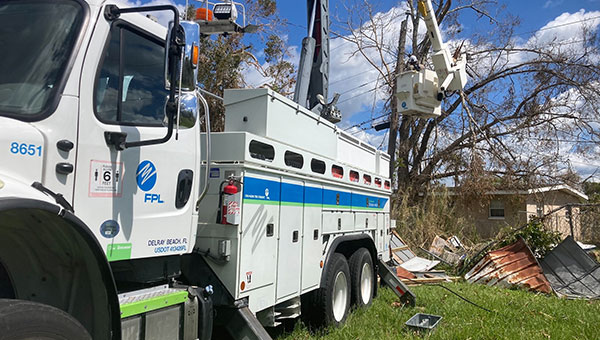
- Two hurricanes and natural gas price increases expected to impact customer bills
- Fuel bills from 2022 already paid by FPL but not yet recovered would be spread over 21 months while lower projected fuel costs for 2023 would provide a partial offset
- Cost recovery for Hurricanes Ian and Nicole would be spread over a 12-month period
- Typical 1,000-kWh residential bill would remain below national average after the proposed changes
JUNO BEACH, Fla., Jan. 23, 2023 /PRNewswire/ -- Florida Power & Light Company today filed a proposal with the Florida Public Service Commission (PSC) to adjust customer rates to recover costs associated with two hurricane restorations and the volatility of natural gas prices during 2022.
The plan, which must be approved by the PSC, seeks to balance unrecovered fuel and storm costs from 2022 and a recent decline in projected 2023 fuel costs to minimize the impact on customer bills.
|
FPL Proposal for Fuel and Storm Costs Effective April 2023 |
|||
|
Item |
Description |
Duration on Bill |
Bill Impact |
|
2022 Fuel Under-recovery |
2022 natural gas prices higher |
21 months |
Expected |
|
2022 Storm Costs |
Incremental restoration costs from |
12 months |
Expected |
|
2023 Fuel Over-recovery |
2023 natural gas prices expected |
9 months |
Expected |
"FPL has a proven track record of keeping bills below the national average. When events beyond our control – like hurricanes and significant changes in fuel prices – force a change to customer bills, we try to do so in a thoughtful way that minimizes the impact on our customers while balancing the risk of invoices piling up," said FPL Chairman and CEO Eric Silagy. "Still, we recognize that every dollar matters, which is why we encourage customers to use FPL's free tools and simple tips to save energy and money on their electric bills."
If the proposal is approved, FPL's typical 1,000-kWh residential bill for customers in peninsular Florida would increase in April by approximately 10%, as compared to rates that were approved to take effect in February. Even under the proposed plan, FPL's typical residential bill in peninsular Florida is expected to remain well below the national average and remain the lowest among Florida's investor-owned utilities, which collectively serve more than 75% of the state's population. FPL's typical, 1,000-kWh residential bill for customers in Northwest Florida would increase roughly 8% in April as compared to rates effective in February but remain below the national average.
|
FPL typical 1,000-kWh residential customer bill |
||||
|
FPL |
FPL Northwest |
|||
|
April 2023 (proposed) |
% Increase* |
April 2023 (proposed) |
% Increase* |
|
|
$142.88 |
~10% |
$173.09 |
~8% |
|
|
*As compared to rates effective beginning Feb. 1, 2023 |
||||
Rapid responses to restore power after Ian and rare November hurricane
Under PSC rules, FPL and other utilities are responsible for restoring power and paying bills upfront after a hurricane strikes. Utilities then recover their restoration costs through a surcharge on customer bills, subject to PSC review and approval of expenses incurred. In this case, FPL is seeking recovery of $1.3 billion for incremental restoration costs from Hurricanes Ian and Nicole. As part of FPL's plan, customers would pay a temporary storm surcharge for 12 months, beginning in April. Recovering these costs over one year rather than a longer time period reduces the risk of storm costs piling up on customer bills if there are additional hurricanes or severe weather events in 2023.
FPL's investments in hardening the energy grid since the destructive 2004-05 hurricane seasons helped speed restoration times and likely reduced total restoration costs for Ian and Nicole. After Hurricane Irma in 2017, FPL calculated that restoration would have taken four days longer and cost $496 million more if the energy grid had not been hardened. FPL's continued investments in storm hardening led to a rapid response to Ian – earning national honors this month, the 13th time FPL's emergency response has been recognized by industry peers.
As part of today's filing, FPL also responded to the PSC's request to calculate the impact of spreading the remaining costs from past hurricanes that affected customers of the former Gulf Power across all FPL customer bills. Doing so would reduce the monthly storm charge on a typical 1,000-kWh bill in Northwest Florida by nearly $10.
Volatility in price of natural gas
FPL is also seeking permission to recover about $2.1 billion to make up for the difference between projections and actual costs for natural gas in 2022. FPL's proposal would spread these unrecovered 2022 fuel costs over a 21-month period beginning in April 2023 to reduce the impact on customer bills. Partially offsetting these higher fuel costs, FPL plans to decrease its projected 2023 fuel factor by about $1 billion during the final nine months of this year due to a sharp drop in projected natural gas prices after 2023 projections were filed with the PSC in the third quarter of 2022.
Even with the volatility in the natural gas market and sharp increases experienced in 2022, natural gas remains far more cost-effective than fuel oil and coal to generate electricity. FPL's decision in the early 2000s to seek energy independence and modernize its generating fleet by moving away from foreign oil and constructing ultra fuel-efficient clean energy centers and leading America's largest solar expansion has saved customers more than $14 billion while dramatically reducing carbon emissions. In fact, FPL's 50 solar power plants – the largest fleet in America – don't use fuel at all to generate electricity, avoiding about $375 million in fuel costs in 2022 alone. FPL will add 16 more solar plants in 2023 as part of plans to install 90,000 megawatts of solar energy in Florida and massively expand battery storage over the next two decades.
FPL offers energy-saving tips to customers
With the bill increase proposed to take effect in April 2023, FPL is encouraging customers to take steps now to lower their bills by reducing energy use and making their homes more energy efficient. For example:
- Depending on the season, customers should cool their home at 78°or warmer or heat their home at 68° or cooler. Each degree customers lower or increase the temperature on their thermostat can reduce their bill by 5% a month for heating or cooling costs.
- Customers can clean the lint filter in their dryer before each load to minimize drying time.
- Turn off ceiling fans and lights in unoccupied rooms.
- View daily, weekly and monthly energy use by using the FPL Mobile App, which is available on the Apple App store, Google Play or by texting "App" to MyFPL (69375).
- Customers can activate the free FPL Energy Manager tool to monitor how their home is using energy and identify ways to save.
- For more helpful tips, customers can visit FPL.com/waystosave.
Florida Power & Light Company
As America's largest electric utility, Florida Power & Light Company serves more customers and sells more power than any other utility, providing clean, affordable, reliable electricity to approximately 5.8 million accounts, or more than 12 million people. FPL operates one of the most fuel efficient and cleanest power generation fleets in the U.S. and in 2022 won the ReliabilityOne® National Reliability Award for the seventh time in the last eight years. The company was also recognized by Escalent in 2022 as one of the most trusted U.S. electric utilities for the ninth consecutive year. FPL is a subsidiary of Juno Beach, Florida-based NextEra Energy, Inc. (NYSE: NEE), a clean energy company widely recognized for its efforts in sustainability, corporate responsibility, ethics and compliance, and diversity. NextEra Energy is ranked No. 1 in the electric and gas utilities industry in Fortune's 2022 list of "World's Most Admired Companies" and recognized on Fortune's 2021 list of companies that "Change the World." NextEra Energy is also the parent company of NextEra Energy Resources, LLC, which, together with its affiliated entities, is the world's largest generator of renewable energy from the wind and sun and a world leader in battery storage. For more information about NextEra Energy companies, visit these websites: www.NextEraEnergy.com, www.FPL.com, www.NextEraEnergyResources.com.
SOURCE Florida Power & Light Company

